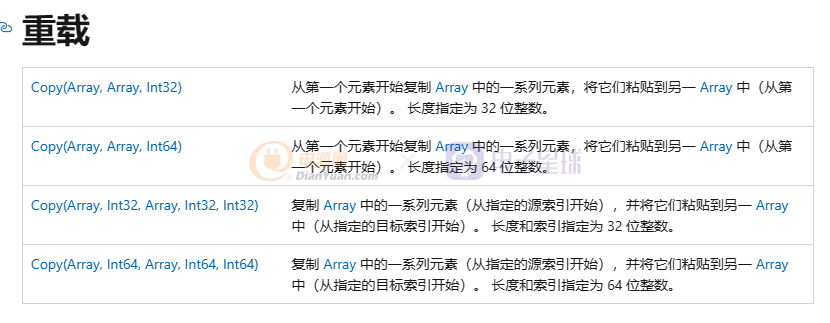数组复制:
C#实现:
Copy(Array, Int32, Array, Int32, Int32)
复制 Array 中的一系列元素(从指定的源索引开始),并将它们粘贴到另一 Array 中(从指定的目标索引开始)。 长度和索引指定为 32 位整数。

c++实现:
1.字符数组
使用strcpy
2.int,float,double等数组
使用memcpy,如复制一个长度为5 的 float数组,则代码示例如下
int len = 5;
float a[len] = {1.0 ,1.1, 1.2, 1.3, 1.4};
float b[len];
memset(b, a, len*sizeof(float));
memcpy(b, a, len * sizeof(float));注意,第三个参数不是指数组个数,而是指要复制的数据的总字节数长度
字节数组(C++中unsigned char)转16位整数
C#实现:
[System.CLSCompliant(false)]
public static ushort ToUInt16 (byte[] value, int startIndex);参数
value Byte[]
包含要转换的两个字节的字节数组。
startIndex Int32
value 内的起始位置。
返回UInt16
由两个字节构成、从 startIndex 开始的 16 位无符号整数。
byte[] byteArray = {
15, 0, 0, 255, 3, 16, 39, 255, 255, 127 };
BitConverter.ToUInt16( byteArray, 1 );
BitConverter.ToUInt16( byteArray, 0 );
BitConverter.ToUInt16( byteArray, 3 );
BitConverter.ToUInt16( byteArray, 5 );
BitConverter.ToUInt16( byteArray, 8 );
BitConverter.ToUInt16( byteArray, 7 );
输出:
index array elements ushort
----- -------------- ------
1 00-00 0
0 0F-00 15
3 FF-03 1023
5 10-27 10000
8 FF-7F 32767
7 FF-FF 65535C++中无符号字节数组转无符号16位整数实现:
#include <iostream>
using namespace std;
int main()
{
unsigned char ch[4] = { 0xAA,0x11,0x02,0x04 }; //-----》使用uchar
printf("%d %d\n", *ch, *(ch + 1));
printf("%x %x\n", *ch, *(ch + 1));
printf("uint8_t:%d %d\n", *(uint8_t*)ch, *(uint8_t*)(ch + 1));//十进制
printf("uint8_t:%x %x\n", *(uint8_t*)ch, *(uint8_t*)(ch + 1));//十六进制
printf("uint16_t:%d %d\n", *(uint16_t*)ch, *(uint16_t*)(ch + 1));//十进制
printf("uint16_t:%d %d\n", *(uint16_t*)(ch+2), *(uint16_t*)(ch + 3));//十进制
printf("uint16_t:%x %x\n", *(uint16_t*)ch, *(uint16_t*)(ch + 1));//十六进制
system("pause");
return 0;
}输出:

